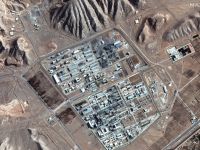The World Conservation Union holds its first congress of the millennium in Amman in October, with 2,500 delegates discussing environmental protection in what is being touted as the biggest ecological event ever held in the Middle East.
Conference patron, Queen Noor, said the meeting was aimed at promoting dialogue between governments, non-governmental organizations, the private sector and local communities.
She told AFP that Jordan's own environmental efforts were "a model for conservation policy and programs for others in the Middle East".
Jordan is facing several developmental challenges, she added. "But since the early 1960s with the establishment of our first national environmental organization, Jordan has been working to achieve a sustainable development."
Maritta Koch-Weser, director general of the World Conservation Union, also known as the IUCN, described the planned congress as "the biggest conservation gathering ever to be held in the Middle East and the first major conservation event of the new millenium.
"Eight years after the Rio earth summit we have not attained the goals of sustainable development," she said, adding that 'Ecospace,' as the congress will be known, "will send a message to the world that the link between environment and development is particularly relevant for developing countries."
Queen Noor said she hoped the Amman congress "will further impress upon planners and decision makers worldwide that environmental protection is a prerequisite for the social, economic, and even political security of people, for the sustainability of natural resources and for the reduction of human suffering."
"Many of the causes... of tension within and among societies... are environmentally related," she said, adding that the organizers of the congress hope to focus on identifying the causes and linking resource degradation to conflict.
The congress will have theme sessions focusing particularly on "environment and security strategies," the organization said in a statement, along with "strategies for averting the world water crisis, agriculture, bio-diversity, economy and society, the ecological limits of climate change".
It will present delegates with its latest list of animal species threatened with extinction and plans to tackle the problem.
The last congress of the IUCN was held in Montreal, Canada, in 1996 and called on all countries to respect commitments made at the Rio summit of 1992 to ensure the protection of the environment.
The IUCN is considered the biggest world conservation organization, grouping 76 countries, 122 public bodies and 737 non-governmental organizations, along with some 10,000 experts and scientists from 181 countries.
Since it was formed in 1948, it has helped more than 75 countries put national conservation strategies in place and helped coordinate several world conventions on the environment - AMMAN (AFP)
© 2000 Al Bawaba (www.albawaba.com)







